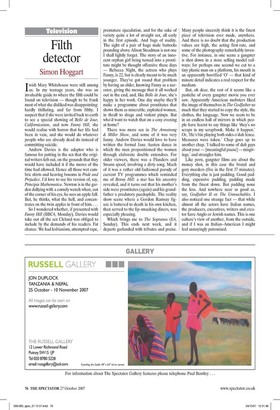Filth detector
Simon Hoggart Iwish Mary Whitehouse were still among us. In my teenage years, she was an invaluable guide to where the filth could be found on television — though to be frank most of what she disliked was disappointing: hardly titillating, and far from filthy. I suspect that if she were invited back to earth to see a special showing of Belle de Jour, Californication, and now Fanny Hill, she would realise with horror that her life had been in vain, and she would do whatever people who are already dead do instead of committing suicide.
Andrew Davies is the adaptor who is famous for putting in the sex that the original writers left out, on the grounds that they would have included it if the mores of the time had allowed. Hence all those wet cambric shirts and heaving bosoms in Pride and Prejudice. I'd love to see his version of, say, Principia Mathematica. Newton is in the garden dallying with a comely wench when, out of the corner of his eye, he sees an apple fall. But, he thinks, what the hell, and concentrates on the twin apples in front of him So I wondered whether, if presented with Fanny Hill (BBC4, Monday), Davies would take out all the sex Cleland was obliged to include by the demands of his readers. Fat chance. We had lesbianism, attempted rape, premature ejaculation, and for the sake of variety quite a lot of straight sex, all early in the first episode. And bags of nudity. The sight of a pair of huge male buttocks pounding above Alison Steadman is not one I shall lightly forget. The story of an innocent orphan girl being turned into a prostitute might be thought offensive these days — Rebecca Night, the actress who plays Fanny, is 22, but is clearly meant to be much younger. They've got round that problem by having an older, knowing Fanny as a narrator, giving the message that it all worked out in the end, and, like Belle de Jour, she's happy in her work. One day maybe they'll make a programme about prostitutes that shows them as miserable, exploited women, in thrall to drugs and violent pimps. But who'd want to watch that on a cosy evening at home?
There was more sex in The Armstrong & Miller Show, and some of it was very funny. Andrew Davies would love to have written the formal Jane Austen dance in which the men propositioned the women through elaborate double entendres. For older viewers, there was a Flanders and Swann spoof, involving a dirty song. Much of it was a rather old-fashioned parody of current TV programmes which reminded me of Benny Hill: a star has his ancestry revealed, and it turns out that his mother's side were prostitutes (again) and his grandfather a predatory paedophile. The reality show scene where a Gordon Ramsay figure is battered to death in his own kitchen, then served to the lip-smacking diners, was especially pleasing.
Which brings me to The Sopranos (E4, Sunday). This ends next week, and it departs garlanded with tributes and praise.
Many people sincerely think it is the finest piece of television ever made, anywhere. And there is no doubt that the production values are high, the acting first-rate, and some of the photography remarkably inventive. For instance, in one scene a gangster is shot down in a store selling model railways; for perhaps one second we cut to a tiny plastic man on a platform, his mouth in an apparently horrified '0' — that kind of minute detail indicates a real respect for the medium.
But, oh dear, the rest of it seems like a pastiche of every gangster movie you ever saw. Apparently American mobsters liked the image of themselves in The Godfather so much that they started to copy the style, the clothes, the language. Now we seem to be in an endless hall of mirrors in which people have learnt to say things like 'they's no scraps in my scrapbook. Make it happen.' Or, 'He's bin playing both sides o'duh fence. Measures were taken.' Chap goes up to another chap. 'I talked to some of duh guys about your — [meaningful pause] — misgivings,' and strangles him Like porn, gangster films are about the money shot, in this case the brutal and gory murders (five in the first 37 minutes). Everything else is just padding. Good padding, expensive padding, padding made from the finest down. But padding none the less. And nowhere near as good as, say, Godfather II or The Untouchables. I also noticed one strange fact — that while almost all the actors have Italian names, the producers, executives, writers and creator have Anglo or Jewish names. This is one culture's view of another, from the outside, and if I was an Italian–American I might feel annoyingly patronised.


































































 Previous page
Previous page